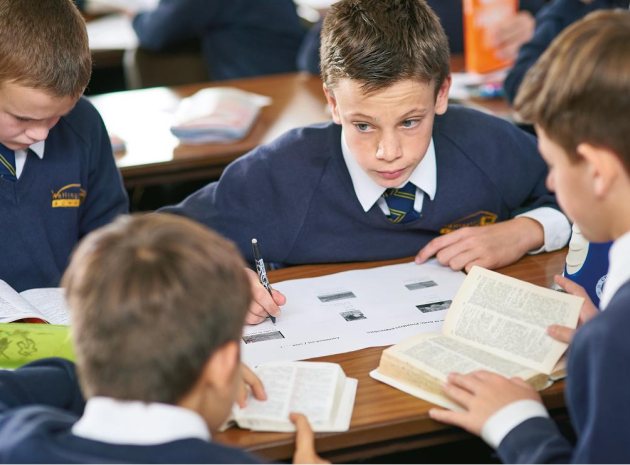As anyone who has been a teacher for longer than approximately five minutes – anywhere in the country and in any kind of school – would doubtless confirm, there are no easy gigs in education. No matter how well resourced your establishment; regardless of how enthusiastic and engaged the parent body; and whether the young people in your care are used to fancy cars and foreign holidays or charity shop trainers and waiting for the bus – at the start of a new academic year, every classroom represents a similarly fragile ship on uncharted waters, with clear challenges ahead as well as the prospect of storms that could hit at any time. Quite simply, kids are more or less the same wherever you go – and the task of helping to nurture them through adolescence whilst simultaneously preparing them not only to pass exams but also to develop the kinds of skills and resilience likely to lead them to a successful life in adulthood (not to mention ensuring they collect precious and joyful memories along the way) is always as daunting and difficult as it is rewarding; at least, it is if you’re doing it right.
A sound understanding of this basic truth is quite possibly one of the most useful assets a head teacher can have – and perhaps especially so when taking on leadership of the kind of school where the difficulties students face are not necessarily as apparent as they might be elsewhere. Wyll Willis took on leadership of Wallingford School nine years ago, having previously taught in Middlesborough, Hartlepool and Rotherham – not, as he points out with a mischievous twinkle in his eye, the kinds of places one tends to go on holiday. Clearly, headship of an 11-18 organisation serving an elegant Oxfordshire market town and its surrounding villages was likely to prove a somewhat different experience – but at no point did Wyll assume that it would be a sinecure, or anything like it.
A strong start
“When I arrived it was scruffy,” he says, with characteristic blunt honesty. “The kids weren’t well dressed, the behaviour was poor and the staff weren’t on it. But even from before I was offered the job, I was hooked – the people were brilliant, and you only had to open a classroom door to see how it could be turned around. For the first couple of years, then, we went after behaviour – really hard, because that was what was obviously wrong. We brought in a smart uniform and picked up on every transgression, no matter how minor. And it really started to take off; the trajectory of improvement was pretty tight, and we quickly started changing our reputation in the community.”
So far, so good – but alas, there was a sharp lesson in store for Wyll, and it’s one he is not afraid to discuss. “I made the mistake of continuing to work on the kids,” he explains candidly. “I thought, if working on them and their behaviour had got us this far, then carrying on would take us even further. But it didn’t – because what we really needed to focus on was teaching and learning. It was down to me. I’ve got a staff team made up of good, decent people who care about what they are doing; and of course, when I wasn’t chasing them about what was happening in the classroom, they assumed I was happy. Why wouldn’t they?”
A shift down to ‘satisfactory’ following a 2011 Ofsted inspection confirmed for Wyll what he had started to suspect regarding the need for a change of focus – so, painful though such judgements always are, he took it on the chin, accepted responsibility, and called upon his loyal team of hardworking staff to rally round. “I stood up in front of them,” he recalls, “and said, ‘Look, it’s us. These kids are wonderful, we are lucky to work in a community like this and you are fantastic teachers. There’s no reason we shouldn’t be right at the top (and I mean, for value added – I’m not interested in anything else). It starts with me – if I was doing my job properly, this wouldn’t have happened. But we can’t carry on doing what we’re doing, because at the moment, we are letting down a bunch of kids we say we love.’ And you know what?” he concludes. “They were absolutely brilliant. They walked straight from there to a series of meetings where they sat and broke everything down, working out what all of those young people needed by way of support, and how our practice had to improve. I got in an excellent deputy head teacher with experience of inner city schools and got him looking at achievement in KS4. Within a year we had a set of results in all those key areas – core subjects, C/D borderline students, A and A* and so on – and the following year that same success broke out everywhere, right across all departments and all abilities. Everyone raised their game and it was a really cool feeling.”
Safe spaces
Despite what appearances might lead one to assume, the young people starting at Wallingford in Y7 do so with levels of attainment that are bang on the national average; not just on the mean, but across the full bell curve of achievement. Final results, however, are considerably above what might be expected from such a starting point – indeed, the school is in the top 5% nationwide in terms of value added across the board. Wyll is fairly vocal when it comes to what he thinks about schools and SLTs that chase “league table places”, too often at the expense of what is actually best for students, he observes – but this level of added value is, he says, a result of which he is genuinely proud.
So, how do they do it? Walking around the school and experiencing the teaching and learning in action, it’s clear that in many ways Wallingford takes quite a traditional approach to educating its young people. Not, Wyll is quick to clarify, as part of some kind of Goveian mission to recreate a mythical Golden Age of compliant pupils being fed lists of facts by teachers who are never to be questioned – on the contrary, teaching and learning here is as creative, collaborative and student-centric as any would-be progressive could wish – but in the sense that expectations are consistently high; behaviour management is strict; courtesy and politeness of expression are valued alongside academic achievement; and there is a general atmosphere of industry and respect. There is no setting or streaming at all in Y7, then the smallest amount possible in linear subjects (maths, science and MFL) thereafter; in every classroom, whilst differentiation is managed in a variety of ways, and there is always the opportunity for a young person to request clarification or extra help, the vocabulary used is uncompromisingly academic, and the concepts discussed, complex. It’s teaching to the highest denominator, with solid support in place for all learners, and everyone is encouraged to overreach as a result.
You can often tell a lot about a school by observing what happens in the staffroom – at Wallingford, it is clearly a space where people gather together to review and share what has just happened in their classrooms; to discuss new ideas; and pass on things that have worked well, or perhaps not quite as effectively as expected. The walls are covered with quotations from educationalists to spark lively debate, chairs are arranged in a huge circle with plates of biscuits laid out invitingly on tables, and although there are break-out rooms for meetings and quiet work, there are no shadowy corners where people can huddle in solitude and check their phones. Sure enough, seconds after the bell has rung for break time, the room starts to fill up with teachers who instantly fall into conversations with each other; there’s a positive vibe that’s impossible to miss.
“Staff feel valued here,” confirms Wyll. “If someone isn’t delivering, the deal is that we hold up a mirror to ourselves and ask what we can do to help them get better. People don’t improve if you’re kicking and threatening them as much as they do if you’re supporting and encouraging them. I employ a staff wellbeing officer who deals with all those things you know should happen as a head, but which can easily get overlooked – so, the flowers and cards get sent; the conversations that need to happen, happen; the socials are organised. This is a place where people enjoy being at work.”
The staff are happy and dedicated, the students are diligent, polite and well spoken – and the view from the windows isn’t too bad, either. It would be very easy to pay a visit to Wallingford and come away with the impression that producing impressive results must have been a breeze for Wyll and his team. But that would be naive, and a gross underestimation of the effort every educator puts into his or her job; not to mention a misrepresentation of what Wyll and his team actually want to achieve. “We’re creating a bubble, in a way,” he says. “A place in which behaviour and expectations are such that it’s impossible to tell the child from the family that’s lived on benefits and had no work for two generations from the one whose parents are consultants at the John Radcliffe; and in which every young person can fly. I’m not interested in chasing targets or taking over more schools – I don’t think that’s in anyone’s heart when they set foot in a classroom for the first time. I’d rather like to retire and feel good about what I did; and the staff I employ feel the same way.”










